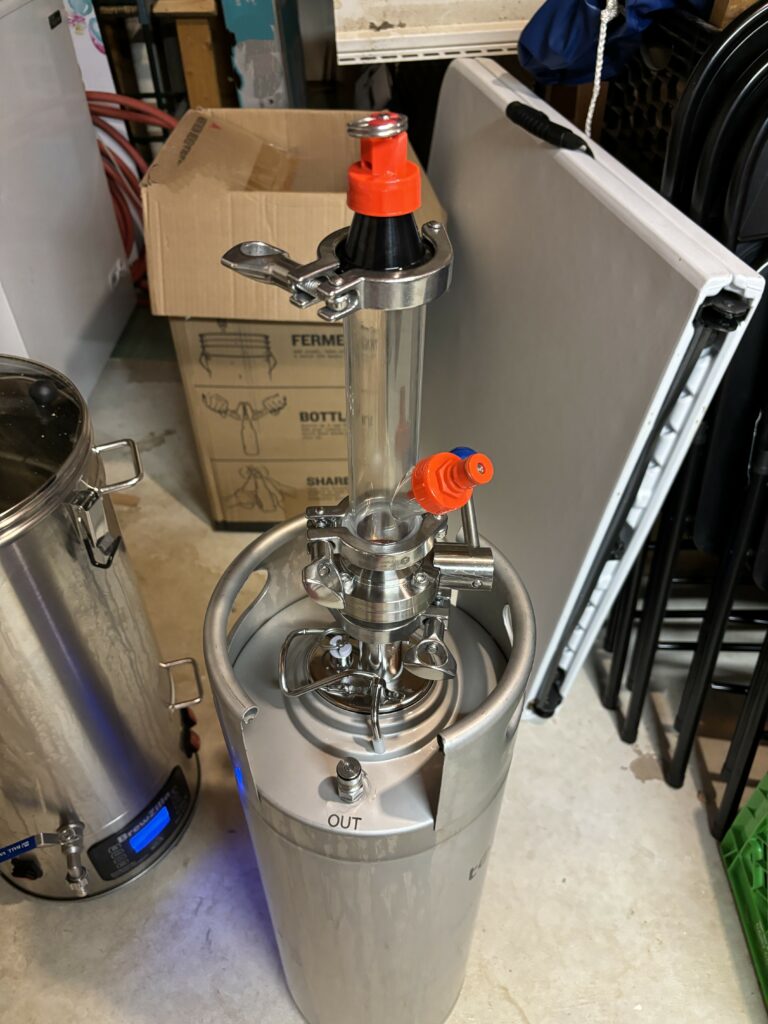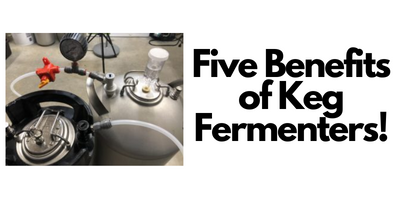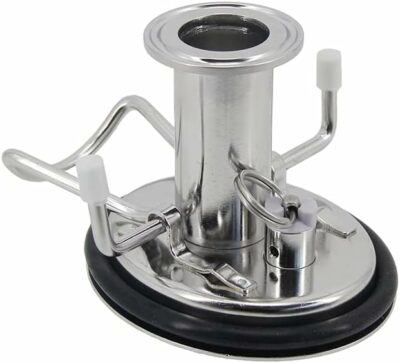
Building a Dry Hopper for Corny Kegs – Dry Hop Under Pressure!
 Thanks to /u/NachoTacocat on r/homebrew for this photo and build info!
Thanks to /u/NachoTacocat on r/homebrew for this photo and build info!
Benefits of Fermenting Under Pressure + The Challenges of Dry Hopping Under Pressure
Fermenting under pressure has some great benefits. One of the challenges that using this method presents is… dry hopping. When fermenting under pressure the beer is carbonated. Adding dry hops to a fermented and carbonated beer, especially one at relatively warm fermentation temps equates to a Mentos+Diet Coke sort of situation. The hops provide lots and lots of nucleation points that can cause the beer to erupt expelling foam all over the place in the process denaturing head retaining proteins.
FermZilla fermenters from Kegland have a ready made solution called the Hop Bong. It allows you easily dry hop under pressure. Since the beer and dry hops are under pressure you don’t have foaming problems when dry hopping.
This article contains affiliate links. We may make a small percentage if you use our links to make a purchase. You won’t pay more and you’ll be supporting Homebrew Finds and more content like this. Thank you for your support!
The Hop Bong has the added benefit of being able to dry hop oxygen free, since you can purge the chamber prior to dropping hops.
What About Keg Based Fermenters?
Another fermenter type that homebrewers like to use when fermenting under pressure (and not fermenting under pressure for that matter) are…kegs. As of this writing, there is no ready built solution for dry hopping under pressure in a homebrew keg.
/u/NachoTacocat on r/homebrew has adapted some of the parts and pieces of the Hop Bong to work with an available TC ball lock keg lid. That build is pictured above installed on a ball lock keg. The parts list and photo are published her with permission.
Building a Dry Hopper for Corny Kegs
From /u/NachoTacocat
Here are all of the pieces I used.
- (1) Hop Bong Sight Glass – 1.5 in. T.C. FE201
- (1) Hop Bong Cap – PCO1881 Male x 1.5 in. T.C. FE203
- (1) Red PRV 1881 Cap Combo (35 psi) KG524
- (1) Carbonation and Line Cleaning Ball Lock Quick Disconnect (QD) Cap – Red Plastic FE133
- (3) ForgeFit® Stainless Tri-Clamp – 1.5 in. Clamp FF100
- (3) ForgeFit® Tri-Clamp Gasket (Silicone) – 1.5 in. FF101S
- -or- on the rec of u/storunner13 DR.COMPONENT 1.5″ Sanitary Standard Type II Flanged Tri-Clamp Gaskets, (Pack of 20),Black Buna-N (NBR)
- (1) ForgeFit® Stainless Tri-Clamp End Cap – 1.5 in. FF102 to seal butterfly valve when hop bong
- (1) 304 stainless steel Cornelius Keg Lid with 1.5″ Tri-clamp Ferrule,NEW Corny Beer Keg Lid 60PSI PRV Food Grade Dry Hopper – affiliate link, note that multiple variations of this product may be available, as such a different version may appear at this link
- (1) DERNORD Sanitary Butterfly Valve with Pull Handle Stainless Steel 304 Tri Clamp Clover (1.5″ Tube OD) – affiliate link, note that multiple variations of this product may be available, as such a different version may appear at this link
I just used the setup to add 4oz hop pellets to an NEIPA and my tips/recommendation: do 2oz max at a time, and open close the butterfly valve to get the hops to move into the fermenter.
Notes from HBF:
- As you can see this assembly is installed on a Torpedo keg. Since it’s based on a standard sized keg lid (albeit modified from standard) my guess is this will fit on many ball and pin lock kegs.
- Why not use a standard Hop Bong? These are intended to be installed on compatible FermZilla fermenters and feature 2″ TC Ferrules. That’s too large for the TC Keg lid that’s available. If you already own one of these you could potentially get a reducer to convert it from 2″ TC to 1.5″ TC
- But… MoreBeer does offer a different version of the Hop Bong that’s designed for BrewBuilt Series X Uni Conicals. This features a 1.5″ TC ferrule.
- Never exceed the rated pressure on any component of your draft system.
- Make sure the components you use are compatible and rated for your intended application. Contact manufacturer with questions about suitability or a specific application. Always read and follow manufacturer directions.
The keg lid this build is based on…
304 stainless steel Cornelius Keg Lid with 1.5″ Tri-clamp Ferrule,NEW Corny Beer Keg Lid 60PSI PRV Food Grade Dry Hopper
More InfoHighlighted Features
- Corny Beer Keg Lid with 1.5" Tri-clamp Ferrule.
- 1.5"TC ferrule is widely used in the homebrew products. You can find many fastic products with 1.5"TC ferrule connection.
- Our corny beer keg lid with 1.5 inch ferrule is a great addition for the corny beer kegs.
- More Sturdy: Made of 304 stainless steel.
- Easy to Install & Use: Large handle makes installation easier; labor-saving design of safety relief valve, no need to keep lifting when deflated, just lift once and rotate 90° to continuously deflate.
Note from HBF: One difference between Pin Lock and Ball Lock kegs is the type of lids that come with each. Ball Locks, generally, have a manual PRV valve, while Pin Locks do not. Ball Lock style lids are, in my opinion, superior because the manual PRV allows you to easily vent your keg as needed. The good news is that, for standard kegs, the lids are the same size and can be interchanged. That means you can use a Ball Lock style lid in a Pin Lock Keg.
304 stainless steel Cornelius Keg Lid with 1.5″ Tri-clamp Ferrule,NEW Corny Beer Keg Lid 60PSI PRV Food Grade Dry Hopper – affiliate link, note that multiple variations of this product may be available, as such a different version may appear at this link
Related Reviews and Resources:
- Fermenting Under Pressure!
- Five Benefits of Using Corny Kegs As Fermenters
- Hands on Review: FermZilla Tri-Clamp Conical
- Hands on Review: FermZilla All Rounder Fermenter
- Hands on Review: Kegland Hop Bong
- What’s the Difference Between Ball Lock Kegs and Pin Lock Kegs?
- Bulk Keg Orings and Keg Repair Part Numbers
Also: Kegerator Tips & Gear | Keg Repair Part #s | Recent Keg Finds
Our Top Draft Resources!
Check our our Top Draft Related Resources- Commentary: Pin Lock Keg Pricing and Availability
- Check Your CO2 Regulator for Leaks!
- How to get a keg ready for first use? New Keg Cleaning and Prep
- Portable Draft Beer Serving Options!
- Pin Lock Keg Pricing and Availability
- The Most Difficult Spot to Check for CO2 Leaks
- Keg O-Ring Materials Selection! – EPDM, Silicone and Buna-N?
- Why Do I Have Bubbles in My Beer Line? Diagnosing and Fixing Kegerator Foam Problems
- Five Benefits of Using Corny Kegs As Fermenters
- Rebuilding & Reconditioning Homebrew Kegs!
- Food Safe Replacement Keg O-Rings in Bulk
- Hands on Review: Kegland DuoTight Fittings & EVABarrier Tubing!
- Why Won’t My Beer Carbonate? Fixing Draft Beer Carbonation Problems
- What Does a Flow Control Faucet Do?
- Upgrade Your Kegerator – 6 Improvements!
- Serve Homebrew on Any Kegerator & Convert Commercial Kegerator to Homebrew
- Tips and Gear for Growler Filling
- What’s the Difference Between Ball Lock Kegs and Pin Lock Kegs?
- Checking for Draft System CO2 Leaks – Using The Pressure Gauge Method
- Tip: Consider Oetiker Stepless Clamps for Kegerator Gas and Beer Lines
- Hands On Review: Inkbird ITC-308 Dual Stage Temperature Controller +WiFi Version
- Universal Poppets Tips and Tricks!
- Convert Your Mark II Keg & Carboy Washer to a Recirculating Draft Line Cleaning Pump!
- Step by Step: Finding and Fixing Keg CO2 Leaks
- Kegerator Temperature Probe Placement – To Immerse or Not To Immerse? – three tests to determine optimal pla…
- Kegerator Beer Line Temperatures & Reducing Foam with a Recirculating Fan
- Kegging CO2 Use Estimations and Calculations
- Balancing Your Kegerator Draft System
- Building a Simple Ball Lock Draft Line Flushing Setup
- Build a Recirculating Draft Line Cleaning Pump
- Home Brew Keg Roundup – New & Used, 5 and 2.5 Gallon & More!
- Damp Kegerator? Fix Kegerator Condensation
- Homebrew Temp Controller Roundup! – Kegerator and Fermentation – concepts, applications and models
- Bulk Keg Orings and Keg Parts Reference
This post may contain affiliate links. We may make a commission when you use our links. This will never cost you extra. Thank you for supporting Homebrew Finds!
greatdealsMake sure the components you use are compatible and rated for your intended application. Contact manufacturer with questions about suitability or a specific application. Always read and follow manufacturer directions. tag:lnksfxd top:dryhopper #tag:tpr


